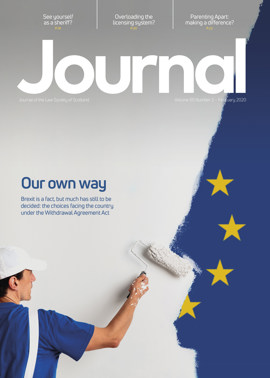Opinion: Alison Atack
In the month of International Women’s Day (“IWD”), it seems appropriate to discuss the theme for 2023, which is #EmbraceEquity. This is not limited to women – the role of “allies” is very important. Gender equity has to be promoted by all. With the effects of Covid hugely questioning the way we run our firms, there could not be a better time to reassess our business models.
Current figures show the legal profession as represented roughly 65% female to 35% male at law school, and 56% female to 44% male in the profession. I am very pleased to report that the Law Society of Scotland will this year be updating its landmark Profile of the Profession survey (last completed in 2018), giving us a much more detailed analysis. Things have certainly come a long way since I was at university, when there were only 14 women in our year (including my twin sister), and very few of them went on to practice.
One of the three challenges the Scottish Government set the legal profession in 2019 was to have a more diverse pool of people apply for traineeships. I think we are well on the way to meeting this. There may now be a general issue in attracting men in proportionate numbers. Women make up around 65-68% of traineeships, and practising certificate renewal for the under 30s stands at 72% women to 28% men. The data we have at present for ethnic minorities are not robust enough, as some population sizes are small, but this year’s survey should give us sounder figures.
Data also show that in 17 large firms in Scotland, women have senior leadership roles, a significant step forward in the last few years, but there is much still to do. The early career figures for diversity balance do not follow through to senior positions.
What still needs to be done to improve this situation? It appears that the childcare load still falls more heavily on women, as was apparent in the recent school strikes, with last minute arrangements impacting more on our female colleagues. There certainly has to be an in-depth look at the availability of affordable childcare to enable lawyers to work – we need Government help on this.
However I feel that Covid has changed this scene enormously, and the findings have to be considered carefully. Within a very short time it became evident that remote working had to be embraced. Previously, those in senior positions in firms were absolutely reluctant to even contemplate the possibility of working from home. I believe strongly that these views, usually of men in leadership roles, were based on the premise that people could not be trusted to complete a day’s work without being in the office – wouldn’t they be much more tempted to play with their children or go to the shops! Even thoughts of them golfing on the sly crept into the heads of those senior lawyers. Very quickly that old chestnut was crushed, and firms provided laptops, remote access and other home kit. It worked, much to the surprise of some antediluvian managers.
Were women disproportionately affected during the restrictions? It did appear that the burden of home schooling fell more on them, but with younger children couples shared the task more. I understand what was seen was senior men being more likely to block out days where they committed to help schooling rather than working, but this wasn’t replicated by women – through fear of being accused of not being able to do it all?
After a time, however, there was a feeling of burnout, not meeting colleagues or being able to chat face to face, so hybrid working made a perfect answer for many. There are pluses, including cutting out the commute, saving time and money, but for them the office still has an important function and the hybrid working balance makes sense, hopefully with mutual agreement on the number of days in-office.
So we have come far with #EmbraceEquity: a far cry from my experience when the senior partner in the large firm I worked for told me I had to start calling myself by my married name when heavily pregnant, and alas very much more recently, my fantastic hardworking assistant being stopped from working from home one day a week to suit childcare arrangements, while a female employee without children based in Barcelona was allowed to do exactly that. I could go on with these awful tales.
Things have to remain forever changed. Learn to trust. Please don’t let the progress that has recently been made in leaps and bounds be lost. The fact we have IWD is proof that we still have far to go. I understand that many do not celebrate or mark the day for that reason. Also it has been said that some of the firms that shout the loudest about IWD have the furthest to go...
Perspectives
Features
Briefings
- Civil court: No rule against redaction
- Corporate: Privileged or confidential – who can access
- Intellectual property: Big tech, AI and enforcement
- Succession: Non face-to-face will instructions; form C1
- Agriculture: “Route map” for agricultural reform
- Parking: About this ticket…
- In-house: Caring for the carers







